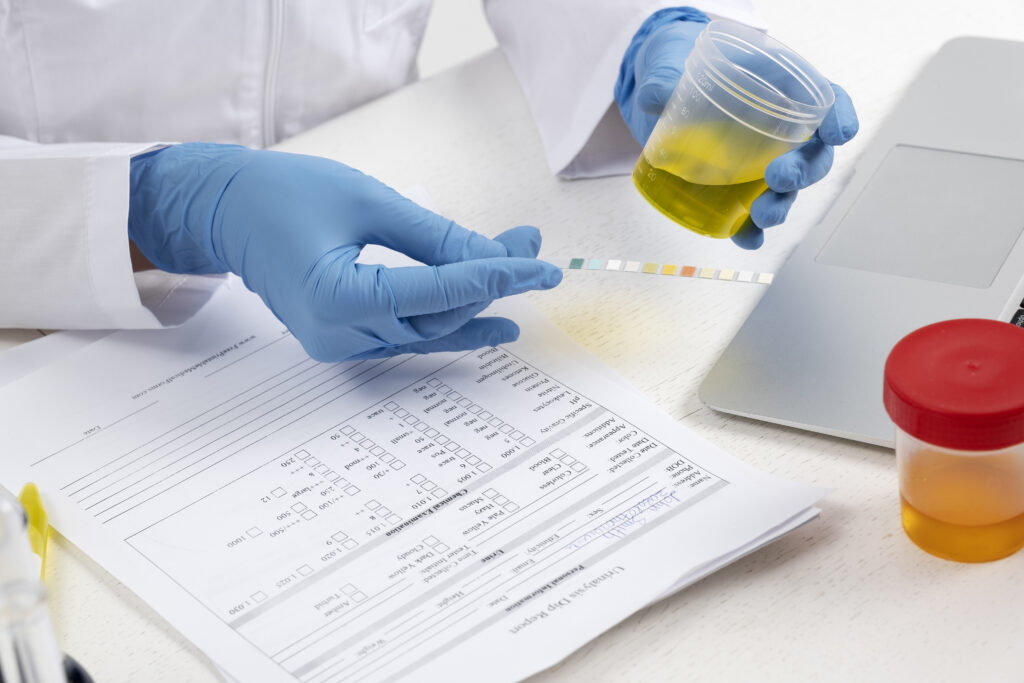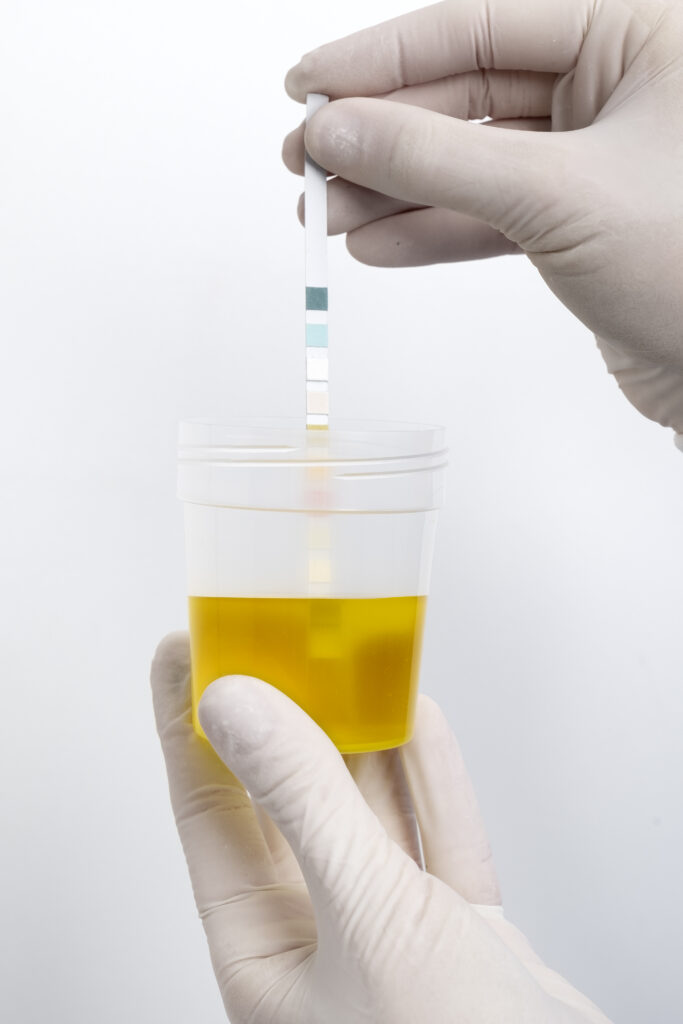Have you ever received a urine test report mentioning pus cells in urine and felt confused or alarmed? You’re not alone. Many people come across this term during routine health checkups or when they’re dealing with urinary symptoms. But what exactly are pus cells? Are they dangerous? Do they always indicate an infection?

Table of Contents
What Are Pus Cells in Urine?
Pus cells, medically known as leukocytes, are white blood cells that appear in urine when there’s inflammation or infection somewhere in the urinary tract. A few pus cells (0-5 per high-power field) can be considered normal, especially in women. However, when the count is elevated, it usually signals an underlying problem, such as a urinary tract infection (UTI), kidney issue, or other inflammatory condition.
Normal Range of Pus Cells in Urine
Understanding what’s considered a “normal” number of pus cells can help you interpret your lab results better:
- 0–5 pus cells/HPF (high-power field): Generally considered normal, especially in females.
- 5–10 pus cells/HPF: Could be borderline or indicate mild infection.
- More than 10 pus cells/HPF: Usually a sign of infection or inflammation that requires medical attention.

Common Causes of Pus Cells in Urine
Top Causes of Increased Pus Cells in Urine:
- Urinary Tract Infection (UTI)
This is the most common cause. Bacteria enter the urinary tract, leading to inflammation and pus formation.
Symptoms: Burning during urination, frequent urge to urinate, cloudy urine, lower abdominal pain. - Kidney Infections (Pyelonephritis)
If the infection travels up to the kidneys, it causes more severe symptoms and a higher pus cell count.
Symptoms: High fever, back pain, chills, nausea, vomiting. - Sexually Transmitted Infections (STIs)
STIs like chlamydia or gonorrhea can also cause pus cells to appear in the urine.
Symptoms: Discharge, pain during intercourse, burning sensation. - Kidney Stones
Kidney stones can scratch and irritate the lining of your urinary tract, which leads to inflammation and a buildup of pus cells.
Symptoms: Severe flank pain, blood in urine, nausea. - Interstitial Cystitis
A chronic bladder condition that can mimic UTIs without any bacterial growth.
Symptoms: Pelvic pain, frequent urination, urgency. - Tuberculosis of the Urinary Tract
Rare but serious, urinary TB can show up as pus cells in urine.
Symptoms: Night sweats, weight loss, persistent urinary symptoms.

Less Common Causes of Pus Cells in Urine
Though less frequent, the following can also lead to pus cell presence:
- Autoimmune diseases like lupus
- Prostatitis (inflammation of the prostate)
- Pelvic inflammatory disease (PID)
- Urinary catheter use
- Bladder tumors or cancers
- Fungal infections, especially in diabetics or immunocompromised people
How Is It Diagnosed?
If your report shows pus cells in urine, your doctor will likely proceed with further investigations:
- Urine Routine Test
This is the initial test that detects the presence of pus cells, bacteria, crystals, blood, and proteins. - Urine Culture
Detecting the Specific Bacteria and Choosing the Best Antibiotic - Ultrasound of Kidneys and Bladder
To rule out stones, tumors, or structural abnormalities. - Blood Tests
Checking Kidney Health and Detecting Widespread Infection - STD Testing
If symptoms or history suggest a possible STI.

Symptoms That Often Accompany Pus Cells in Urine
While some people may have no symptoms, especially if the pus cells are mildly elevated, others may notice:
- Burning or pain while urinating
- Cloudy or foul-smelling urine
- Fever or chills
- Lower abdominal or back pain
- Frequent or urgent urination
- Nausea or vomiting
Don’t Ignore the Warning Signs

Are Pus Cells in Urine Dangerous?
The presence of pus cells in urine is a sign, not a diagnosis. It indicates that your body is fighting off something—possibly an infection or inflammation.Why You Shouldn’t Overlook Ongoing Pus Cells in Urine
Letting pus cells go unchecked can cause serious problems like:
- Kidney damage
- Sepsis (life-threatening infection)
- Chronic urinary issues
- Infertility (in cases linked to STIs)
That’s why timely diagnosis and treatment are vital.
Treatment for Pus Cells in Urine
Treatment depends entirely on the underlying cause:
- Antibiotics: For bacterial infections like UTI or kidney infections.
- Antifungals: For fungal infections.
- Antivirals: If caused by viral infections.
- Hydration: Keep the Fluids Flowing
Staying well-hydrated helps your body wash out toxins and supports a healthy urinary system. - Pain relievers: To ease discomfort and fever.
- Avoid irritants: Like caffeine, alcohol, or spicy food during infection.

Finish Your Antibiotics – No Skipping!
Even if you start feeling better, make sure to take the entire antibiotic course. Stopping early can let the infection come back stronger.
How to Prevent Pus Cells in Urine
Here are evidence-based tips to prevent infections and keep your urinary tract healthy:
- Keep Hydrated: Shoot for 8 Glasses Daily
- Practice good hygiene: Especially after using the toilet and during menstruation.
- Urinate after sex: Helps flush out bacteria.
- Avoid holding urine: Go when you feel the urge.
- Wear breathable cotton underwear: Reduces moisture buildup.
- Control diabetes: High sugar levels increase infection risk.
- Avoid unnecessary use of catheters: They increase infection risk.
Pus Cells in Urine During Pregnancy
Pregnant women are especially prone to UTIs and elevated pus cells due to hormonal and anatomical changes. If left untreated, it can lead to:
- Preterm labor
- Low birth weight
- Kidney infections
This is why urine tests are an essential part of prenatal checkups—to catch any issues early and keep both mom and baby safe.. Treatment is safe and usually involves pregnancy-safe antibiotics.
When to See a Doctor
You should consult a healthcare provider if you:
- Notice persistent urinary symptoms
- Get abnormal urine test results
- Are pregnant and have pus cells in urine
- Have recurrent infections
- Experience fever, pain, or blood in urine
Early treatment helps prevent complications and ensures faster recovery.
Conclusion
Finding pus cells in urine can be alarming, but it’s often just a warning sign that something needs attention. Whether it’s a simple UTI or a more complex issue, early detection and proper management make all the difference. Keep an eye on symptoms, maintain good hygiene, and don’t hesitate to get medical help when needed.
Your urine tells a story—listen to what your body is saying.

I really like your writing style, wonderful info , thankyou for posting : D.
Heya i’m for the primary time here. I came across this board and I in finding It truly helpful & it helped me out much. I hope to present one thing again and help others such as you aided me.
I am very happy to read this. This is the type of manual that needs to be given and not the accidental misinformation that’s at the other blogs. Appreciate your sharing this best doc.